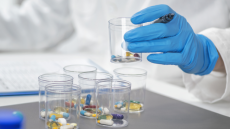Metagenomics revolution: Empress Therapeutics on drug discovery breakthroughs

As head of platform development at Empress Therapeutics, Thompson uses her expertise to advance the company’s Chemilogics platform. This platform explores the vast universe of genetic chemistry, or metagenetics, within the human body, enabling the rapid and predictable generation of advanced starting points for small molecule drug candidates.
Can you explain the concept of metagenomics and its significance in drug discovery?
Whereas human genomics focuses on the collection and study of human DNA alone, human metagenomics analyzes all DNA of the human body, including that of the microorganisms found inside of us (e.g., gut microbes) or on the surface of our bodies. And in the same way that comparing the genomes of healthy and diseased individuals has revealed important molecules and disease targets, comparative metagenomics is revealing new starting points for drug discovery.
Several organizations, for example, including Empress Therapeutics, are looking for bacterial genes encoding enzymes involved in specific biochemical or metabolic pathways. Once identified, researchers can transfer these genes into other more easily manipulated microbes to produce molecules of therapeutic interest.
Metagenomics, therefore, gives us a tool to systematically find and generate the most promising and drug-like of these compounds.
How do you mine metagenomic data for compounds of interest?
Empress Therapeutics discovers compounds encoded in the metagenome by leveraging insights into how groups of genes encode enzymes involved in the production of specific chemical compounds. Then, by comparing metagenomic data from healthy individuals and a matched cohort of people with disease, Empress hunts for genetically encoded molecules that appear to explain clinical outcomes and validates their therapeutic potential in the lab.
It may sound straightforward, but the data required to accomplish this task are incredibly complex and challenging to tease apart. They therefore demand equally complex computational tools such as artificial intelligence (AI) and machine learning (ML) to distinguish the metagenomic differences between health and disease, as well as to identify the chemistry-encoding genes involved.
What are some of the challenges you face in exploring the metagenome for new medicines?
One challenge we face is access to the patient data needed to identify metagenomic changes defining human health and disease. With this in mind, Empress looks to partner with other organizations that are applying advanced genomics technologies to generate increasing amounts of genetic and metagenomic data from patients.
Another bottleneck involves the genetic engineering needed to get cells to produce the compounds encoded in genes. Just like innovations in recombinant DNA were required to unlock the generation of biologic, protein-based drugs, we've had to invent new synthetic biology tools and methods to facilitate our access to this exciting new chemical space.
Can you share any success stories from your drug discovery efforts?
One surprising outcome is the rate of success we're seeing. In one case, our models predicted several novel compounds with possible immuno-modulatory activity. Moving dozens into a relevant animal model, we had a hit rate of more than 50%. As well, we've seen favorable profiles in industry-standard safety and metabolic counter screens. To get this far in development so quickly is simply unheard of.
In some cases, our platform can not only generate a novel target for a disease but also provide the compound to drug that target.
What inspired you to join Empress Therapeutics and pursue this drug discovery approach?
Joining Empress Therapeutics in 2023 was something of a natural evolution—no pun intended—of my previous work.
I started as an evolutionary biologist at the Broad Institute researching how changes in genes and gene regulation gave rise to new characteristics in organisms and ultimately to new organisms. That work led me to Ginkgo Bioworks, where I led the development of multiple next-generation sequencing technologies, and to LifeMine Therapeutics, discovering natural products that fungi used to communicate with other microbes and their hosts and translating the research to humans.
That’s when I heard about the Empress model of looking inside the human microbiome for therapeutics, and I thought “That’s a genius idea.” It’s so simple as to be beautiful. The company isn’t yet very large but is full of very talented people, so it was an opportunity to bring my background in platform and technology development to address this task fully.
What are some of the key milestones and goals for Empress Therapeutics?
Aside from continuing to test the multiple lead molecules we have identified to date in cell and animal models of disease, our next big push is to drive some of our most promising ones towards clinical testing while also expanding into a wide range of therapeutic indications.
We have every reason to believe our platform is indication-agnostic, and we’ve really only scratched the surface of the genetically encoded compounds from the human body. Finding partners to help us quickly build relevant disease expertise to validate our findings in the lab, or help us collect and analyze even more data, will be a focus.
How do you see metagenomics evolving in the future?
I think we're finally starting to uncover the potential of human metagenomics. Not only do we think that there is a vast untapped wealth of important molecules to be discovered and turned into new medicines, but we see the potential to create new types of diagnostics and insights into disease.
Although the scientific community has only uncovered a tiny fraction of the total information encoded in the metagenome, we are making significant inroads, for example, characterizing what compounds genes produce and the functions of those molecules. This field is in the midst of an exponential growth in data, and we're excited about the potential to collaborate and contribute.























